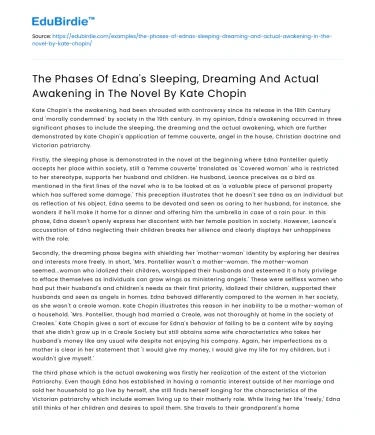Kate Chopin's the awakening, had been shrouded with controversy since its release in the 18th Century and 'morally condemned' by society in the 19th century. In my opinion, Edna's awakening occurred in three significant phases to include the sleeping, the dreaming and the actual awakening, which are further demonstrated by Kate Chopin's application of femme couverte, angel in the house, Christian doctrine and Victorian patriarchy.
Firstly, the sleeping phase is demonstrated in the novel at the beginning where Edna Pontellier quietly accepts her place within society, still a 'femme couverte' translated as 'Covered woman' who is restricted to her stereotype, supports her husband and children. He husband, Leonce preceives as a bird as mentioned in the first lines of the novel who is to be looked at as 'a valuable piece of personal property which has suffered some damage.' This preception illustrates that he doesn't see Edna as an individual but as reflection of his object. Edna seems to be devoted and seen as caring to her husband, for instance, she wonders if he'll make it home for a dinner and offering him the umbrella in case of a rain pour. In this phase, Edna doesn't openly express her discontent with her female position in society. However, Leonce's accussation of Edna neglecting their children breaks her silience and clearly displays her unhappiness with the role.
Save your time!
We can take care of your essay
- Proper editing and formatting
- Free revision, title page, and bibliography
- Flexible prices and money-back guarantee
Secondly, the dreaming phase begins with shielding her 'mother-woman' identity by exploring her desires and interests more freely. In short, 'Mrs. Pontellier wasn't a mother-woman. The mother-woman seemed...woman who idolized their children, worshipped their husbands and esteemed it a holy privilege to efface themselves as individuals can grow wings as ministering angels.' These were selfless women who had put their husband's and children's needs as their first priority, idolized their children, supported their husbands and seen as angels in homes. Edna behaved differently compared to the women in her society, as she wasn't a creole woman. Kate Chopin illustrates this reason in her inability to be a mother-woman of a household. 'Mrs. Pontellier, though had married a Creole, was not thoroughly at home in the society of Creoles.' Kate Chopin gives a sort of excuse for Edna's behavior of failing to be a content wife by saying that she didn't grow up in a Creole Society but still obtains some wife characteristics who takes her husband's money like any usual wife despite not enjoying his company. Again, her imperfections as a mother is clear in her statement that 'I would give my money, I would give my life for my children, but i wouldn't give myself.'
The third phase which is the actual awakening was firstly her realization of the extent of the Victorian Patriarchy. Even though Edna has established in having a romantic interest outside of her marriage and sold her household to go live by herself, she still finds herself longing for the characteristics of the Victorian patriarchy which include women living up to their motherly role. While living her life 'freely,' Edna still thinks of her children and desires to spoil them. She travels to their grandparent's home to spend some quality time with them. Second was Adele Ratignolle's childbirth, 'all her beautiful hair . . . drawn back and plaited. It lay in a long braid on the sofa pillow coiled like a golden serpent” The serpent refers to how the role of a wife and a mother were inescapable. Witnessing Adele Ratignolle's birth had shown her the female body was made for childbirth and thus a ready committment to motherhood. Her realization of her natural position of a wife and motherhood fills her with drive of suicide, as she notices that the presence of her two sons will always be in her life, and her position of a mother could forbid her from living without them since after all a mother's main job is to raise her children properly to adulthood where they could then to take care of themselves; but Edna no longer wanted to be seen as 'Leonce's wife' or ' Raoul's and Etienne's mother.' Therefore she does what she promised herself she wouldn't do, 'Give her life' up to be truly free from her children, husband and the ties of the Victorian patriarchy.
Lastly, both nature and society contribute to making Edna Pontellier into the woman they wanted her to be but through her suicide Edna is finally able to be at peace and escape their hold. Leonce and the society owned her soul by telling her to keep up with experiences, tend to the house, be submissive but it was her two sons who imprisoned her body, being a constant reminder of the torture of childbirth that nature requires her. Nature was a constant reminder to Edna of her love for her children but also a encouragement to her need for individuality that led her to her deathly rebirth.






 Stuck on your essay?
Stuck on your essay?

